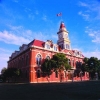includes 2:00 vidThe archeological team dug deeper – finding more proof below the known occupation level. The samples were sent to the University of Victoria for radiocarbon dating.
Those samples point back 13,000 years ago, which is over 2,000 years before records of proven occupation.
“Why is there so much charcoal here, we are in a hyper marine-wet-coastal climate where forest fires are very rare or non-existent. We had my collaborators Terri Lacourse at the University of Victoria and her students did a very detailed – sliced the core into 1 cm slices and analyzed and counted the charcoal bits in there and discovered many peaks of charcoal were statistically significant below the period of known occupation,” said Mathewes.
One major implication of the findings says those here were already adapted to using marine vehicles, hunting and fishing before 13,000 years ago.
*snip*
“The archeological evidence of the animals that were used include marine fish like halibut, salmon and others. What really surprised me was there were bones of albatross in here,” he said.
Another implication challenges what the scenically accepted Clovis First Model – that inhabitants first came through the Bering Strait, through the ice-free corridor to the interior and then adapted to a coastal and marine lifestyle.
“Now it looks like it’s the other way around, people came down using watercraft knowing how to use marine resources. That is a major change in thinking from a land-based to a marine but to marine to probably more land-based,” said Mathewes.
There are still archeologists that oppose the early coastal migration findings like found at Kiglii Gwaay but there are other recent discoveries in North America dating back 16,000 years ago.
Scientific beliefs are shifting that people have been on the coast much earlier than believed.
https://aptnnews.ca/...in-haida-gwaii/
i have a book on vernacular architecture (ie traditional buildings designed without architects) from way back in 1975 where the author, a historian of city planning or architecture & not an archaeologist or anthropologist, says there's an "incontestable" polynesian connection, but doesn't explain why
enrico guidoni, primitive architecture p.112While the tradition has socioeconomic determinants analogous to those in Polynesia, here their effects are highly pronounced. (The historical contacts between groups on the transoceanic routes are still very far from clear, though they are nonetheless incontestable; certainly, though, the Northwest Coast Indian culture came to manifest analogous developments in the interrelationship of art, architecture, and society, and did this with a wealth of variations.)
could the coast natives have arrived somehow by boat, and the rest arrived by the bering land bridge? just putting it out there. can we detect any similarities between these french polynesians & our west coast first nations
https://www.youtube....bed/qiRjToougLY
polynesian cultures from the maori in new zealand & cook islands to the hawaiians also have equivalents to totem poles, called tikis, or anito in the phillippines
edit: i never wondered what a maori meeting house looked like, or whether they even had them. turns out their name for it is wharenui, which means "big house". sounds kind of familiar. just sayin

https://commons.wiki..._meeting_houses
Edited by amor de cosmos, 25 September 2019 - 08:19 AM.













